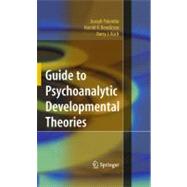
| Discusses comprehensively the broad range of psychoanalytic developmental theories and places each in historical context | |
| Organizes the content of each developmental theory by age categories | |
| Addresses seven psychological schools of thought, with an emphasis on the developmental perspective | |
| Lends to the revival of interest in psychoanalytic theory that was energized with the publication of APAG++s | |
| Psychodynamic Diagnostic Manual (PDM) | |
| Brings to the forefront the ongoing integration of psychoanalysis and the neurosciences with a chapter on the neurobiology of attachment | |
| Table of Contents provided by Publisher. All Rights Reserved. |
The New copy of this book will include any supplemental materials advertised. Please check the title of the book to determine if it should include any access cards, study guides, lab manuals, CDs, etc.
The Used, Rental and eBook copies of this book are not guaranteed to include any supplemental materials. Typically, only the book itself is included. This is true even if the title states it includes any access cards, study guides, lab manuals, CDs, etc.